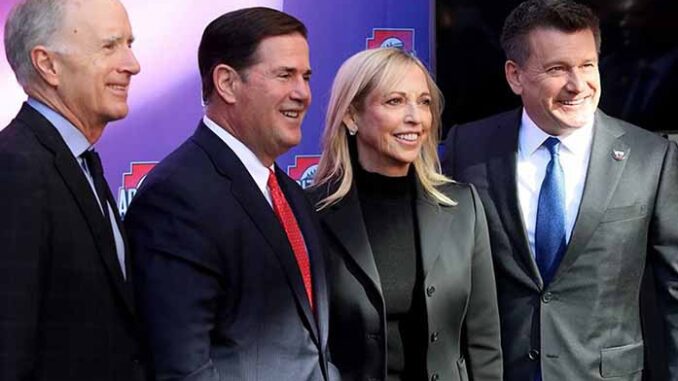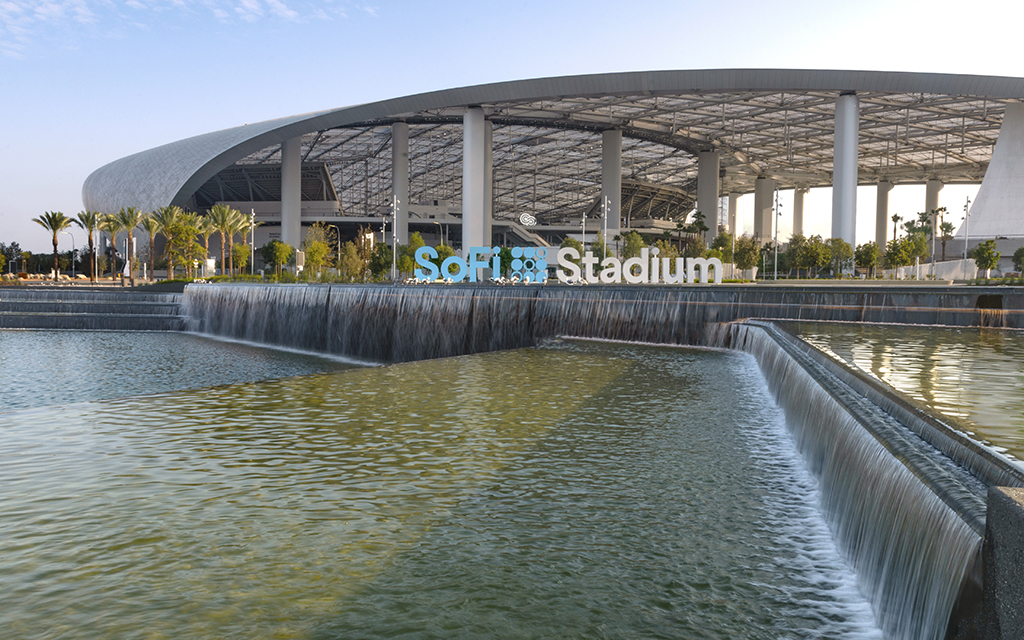
By Jack Loder
PHOENIX – In 384 days, the Super Bowl returns to Arizona.
When the country tunes in on Feb. 12, 2023, to take in one of the world’s most popular sporting events, it will enjoy the fruits of a Herculean effort that has been in the works since the spring of 2018.
On Monday, the host committee board of directors held a “kickoff the countdown” event in downtown Phoenix, marking the official beginning of the year-long promotional campaign for Super Bowl LVII.
“Our mission is to make sure that while we have the world’s attention, to tell the best story possible about Arizona,” Arizona Super Bowl Host Committee president David Rousseau said. “It’s incumbent upon everybody, the hotel community, the municipalities, certainly the business community in addition to the Cardinals organization, to put on an incredible show. It’s one that we’re proud of and I think has everything to do with the fact that we’re back here.”
The event was highlighted by the announcement that former Cardinals All-Pro wide receiver Larry Fitzgerald will serve as the executive chair of the committee’s board of directors. Fitzgerald not only starred on the field for many seasons with the Cardinals, he also endeared himself to the community with his charity work and charisma. Although he no longer suits up on Sundays, it’s fitting that Fitzgerald will play a prominent role in an event of this magnitude.

Gov. Doug Ducey (left), here with Arizona Cardinals Owner and President Michael Bidwill, is excited about the economic impact the state could see from Super Bowl LVII. (Photo by Amanda Valle/Cronkite News)
It’s an event that could greatly benefit the state’s economy. Gov. Doug Ducey offered a positive outlook not just on the prospect of hosting another successful Super Bowl, but on the state’s financial health as a whole.
“Today our economy is wide open. The best restaurants, hotels, resorts and small businesses are in full operation.” he said. “Last year we modernized our state gaming compact amendment, which means visitors can place bets on the Super Bowl and other sports here in Arizona. This all means very exciting things for our economy. The Super Bowl is a force multiplier for economic development.”
Arizona’s two other NFL title games in the 21st century, Super Bowl XLII in 2008 and Super Bowl XLIX in 2015, generated thousands of visitors and dollars. The ‘08 game accounted for an economic impact of over $500 million, according to a 2008 study by economists at Arizona State’s W.P. Carey School of Business. The 2015 game brought in 120,000 visitors and had an economic impact in excess of $700 million.
“That Super Bowl in 2015 remains the most watched United States television show in history,” Ducey said. “I think we can break our own record next year. When the Super Bowl is in Arizona, people watch it on TV.”
While the macroeconomic boom grabs headlines, the benefit of hosting the Super Bowl is felt at even the smallest levels of local economies. Next year, the host committee is introducing the Business Connect program, which will provide event-ready businesses in Arizona the opportunity to compete for contracted work tied to the Super Bowl and its parallel events.
“The Business Connect program supports minority owned businesses, women owned businesses, LGBTQ businesses and veteran owned businesses,” committee chair Jay Perry said. “It’s a terrific partnership between the NFL, the host committee, our local partners and local Arizona businesses.”
The program is aimed at businesses that have at least 51% minority, female, LGBTQ or veteran ownership, and that have had a physical office in Arizona since 2019. The goal, according to AZSuperBowl.com, is to provide a supplier diversity initiative to the Super Bowl business landscape.
Super Bowl LVII will mark the fourth time the Grand Canyon state has hosted the championship game, and the third at State Farm Stadium in Glendale. Only Miami (11), New Orleans (10), Los Angeles (seven) and Tampa Bay (five), have hosted more Super Bowls.
With the emergence of new luxury stadiums in Las Vegas and Los Angeles, the competition to host football’s blue ribbon prize is only going to get stiffer. Los Angeles’ SoFi Stadium will host February’s Super Bowl, while Las Vegas has already landed the Pro Bowl and NFL Draft.
“When we won this bid, there certainly wasn’t a stadium built in Las Vegas,” Cardinals Owner and President Michael Bidwill said. “They’re now hosting not only the Pro Bowl but also the draft, so Vegas is a new competitor. We’ve got L.A, New Orleans, South Florida, so we have to continue to invest in the stadium and also invest in the infrastructure that makes us a great destination for these mega events.”
It takes a village to host a Super Bowl, and if the track record of this committee is any indication of what’s to come, Super Bowl LVII will be a well-oiled machine.

